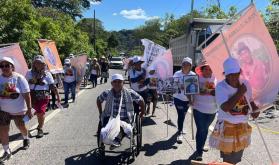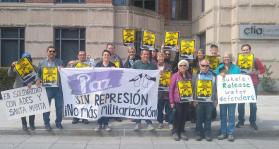Ally Profile: Interview with Margarito Nolasco of the FMLN Youth Secretariat
Anthony Flores, CISPES coordinator from Los Angeles California, currently interning with the San Salvador CISPES team, interviewed Margarito Nolasco, the Secretary General for the FMLN Youth Secretariat on Thursday, December 19, 2013 For over 30 years, CISPES has maintained a strong relationship with the Farabundo Martí National Liberation Front (FMLN). As of January 2013, CISPES with the help from all its donors has had the privilege of helping the FMLN Youth Secretariat’s current project with the Ministry of Education’s National Literacy Program. In December, I had the opportunity to visit Margarito Nolasco, Secretary General of the FMLN’s Youth Secretariat, to present him with a portion of material aid funding that will total $2500 by March 2014. We took a moment to talk about the Secretariat’s ongoing work with CISPES and their current literacy project, which is mobilizing volunteers to help bring literacy to their family and community members who were unable to participate in formal education as children. "With the support of CISPES, the FMLN Youth Secretariat has the possibility of carrying out the work of combating illiteracy in various locations, as well as to motivate the youth to volunteer and continue with their labors by providing them with the resources needed such as transportation, meals and materials in order to continue their labors of literacy effectively,” said Margarito. Secretary General Margarito began with warm greetings for all the friends and comrades of CISPES, and he thanked CISPES for its extensive work alongside the Salvadoran People. Margarito explained that when the FMLN was elected to the presidential office in 2009, as the first leftists government in its history, El Salvador had over 700,000 people (18% of its population) who did not know how to read nor write. The neoliberal politics of the right-wing had not paid any importance to education, and throughout recent decades the cost of schooling was beyond the budget of many Salvadorans. Families could not afford to pay for their children’s school materials, and many required that their children work for the family in the agriculture or domestic labor in order to be able to afford the basic costs of living.
“In the past, education was a privilege,” Margarito explained. Since their initiation into presidency, the FMLN has prioritized the social sectors that have been historically neglected and excluded from neoliberal politics. Margarito highlighted that ensuring that another “50 people learn how to read and write constitutes an important contribution that our youth can be part of the well-being of society.” During the first administration (2009-2014) of the FMLN, El Salvador has eradicated illiteracy for well over 160,000 people of the initial 700,000 adults who could neither read nor write. That amounts to a reduction from 18% to 13% of the illiterate population during the first 4 years of the program; the program and its extensive work has also successfully liberated 15 municipalities free from illiteracy. In addition to the literacy achievements, there has been a significant increase in the creation of jobs related to Ministry of Education programs such as the “Vaso de Leche” (glass of milk) and Scholastic Packets programs which provide students with a no-cost healthy breakfast, school supplies, uniforms and shoes—all of which are no longer produced in sweatshops, but rather distributed as employment projects to small and local producers. Margarito stated that, as the February 2nd Presidential Elections approach, “the FMLN and the social movements are determined to continue with these social and transformative programs.” With support from CISPES, the FMLN Youth Secretariat has been overcoming illiteracy in the municipalities of San Juan Opico, Occidente, La Libertad and San Salvador since December 2013. The project is coordinated from the department of Santa Ana, where the Secretariat is training over 50 youth volunteers. Margarito explained that, “the objective of the National Literacy Program is not only so that people learn how to read and write, rather how they also re-enter in a more effective way into life, the productive life and into society; and to generate a higher self-esteem, because knowing how to read and write allows them to participate in the social life of the country.” Margarito explained that, “CISPES’s support serves to motivate and invite the Youth to serve as volunteers for literacy.” But beyond that, Margarito illustrated that the relationship between the Youth Secretariat of the FMLN and CISPES contributes to a society that is more just: “in the most difficult of times during the armed conflict in the 1980’s, CISPES made a great labor of solidarity with our people in El Salvador.” He recognized that the “people of the United States of America are a noble people because they are always accompanying the Salvadoran People, similar to other people of the world. After the armed conflict and after 30 years of solidarity, CISPES has the capacity to renew itself and invite the Youth of this generation to stand and struggle in solidarity.”

 "I am a CISPES supporter because continuing to fight for social justice and a more people-centered country means continuing the dream and sacrifice of thousands of my fellow Salvadorans who died for that vision.” - Padre Carlos, New York City
"I am a CISPES supporter because continuing to fight for social justice and a more people-centered country means continuing the dream and sacrifice of thousands of my fellow Salvadorans who died for that vision.” - Padre Carlos, New York City

